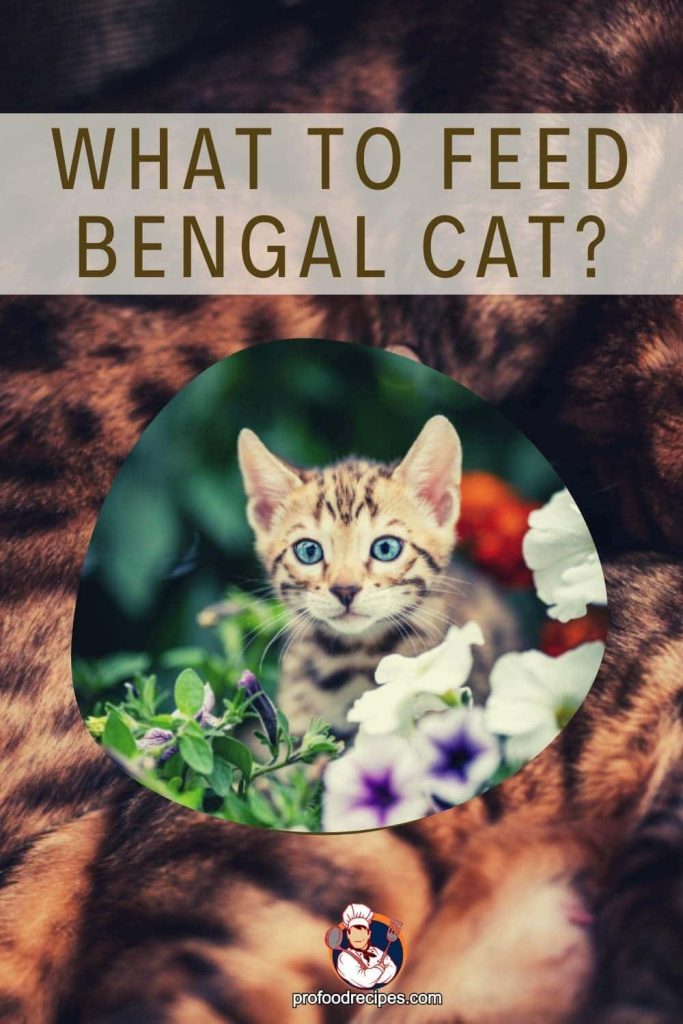Last Updated on June 23, 2022 by Amanda P. Brown
A Bengal cat is an intelligent domesticated cat breed. Seeing its wild leopard appearance nowadays, people think they are very restless. But in nature, they are adorable, loving, and loyal. To grow this breed, healthy people need to know what to feed Bengal cats.
As a cat parent, Every Bengal cat owner should know about what to feed Bengal Cat. As Bengal cats are obligate carnivores, they need protein-rich foods to survive. However, a lot of people lack sufficient knowledge regarding their diet. This makes it incredibly dangerous for these cats.
Why is Proper Nutrition Important for Bengal Cats?
Table of Contents
To maintain good health, feline companions require a balanced meal.
This can only develop with the help of a good diet. First, you should be aware that Bengal cats have a short intestines and a sensitive digestive system. As a result, they are at risk of contracting the dreaded Bengal diarrhea without a proper diet.
That means that in the beginning, we must feed the Bengal kittens protein-based dry cat foods and help them get used to their new surroundings. These foods ought to be nutrient-dense. As long as we keep track of these things, we’ll need to weigh them again in a month. The protein level in cats’ diet must be low if their growth is faster than usual.
Now that your problems have been resolved, let’s talk about Bengal cat food and how it can help you provide your cat with proper nutrition. After reading our recommendations, you will be aware of what to feed them and the quantity you should give them. To ensure a healthy start in life for them, you won’t have to stress about what to feed Bengal cats anymore.
What to Feed Bengal Cats?

As a cat parent, I serve my Bengal Cat 3 types of food.
- Raw Meat
- Veggies
- Homemade Food
1. Raw Meat
Like all other cat breeds, raw meat is the primary food source for Bengal cats. Or you can say raw meat is the ideal raw food for Bengal cats. Their digestive system can digest raw meat due to their genetic make-up.
However, we must ensure that the protein content of their diets is between 50 and 80 percent, with the remainder going to fiber and vitamins. Their digestive system is shorter than a human, but that doesn’t stop them from processing food at a breakneck pace. The transition from one food to another over 12 to 16 hours.
They strongly desire animal products, particularly meat, because their digestive system can’t get enough nutrition from plant-based foods, which is unfortunate.
Bengal cats eat a lot of meat, especially chicken, beef, lamb, fish, turkey, eggs, and dairy products. They find that eating fresh meat helps with both their skin and stomach issues.
Furthermore, a raw meat diet should consist of all animal tissues, including meat, organs, and bones. Raw meat contains essential proteins like taurine, an essential amino acid that helps keep the retina and heart-healthy.
Here are some details about raw meat that you can serve your Bengal cat:
Chicken
Because of the high protein content in boiled chicken, it is an excellent option for Bengal kitten food. Skinless chicken breast contains low sodium and fat. It also includes many helpful nutrients and vitamins B6, C, and A. Chicken meat helps Bengal cats to maintain their weight and to make a balanced diet. So you can’t avoid chicken meat in their balanced diet plan.
Turkey
Turkey meat contains more fat than chicken. It is a fantastic source of lean protein as well. It has many valuable nutrients, vitamins, magnesium, and potassium, which help prevent urinary disorders and form stones and crystals. Sometimes cats prefer turkey more than chicken. But this raw meat should be fresh. You should not keep it at room temperature for more than 30 minutes.
Duck
Duck meat is also popular cat food. You can feed duck meat to Bengal cats if your cat is allergic to chicken and turkey. Duck meat contains protein, selenium, iron, and potassium vitamin B6. But it has very high protein. So to provide a balanced diet, you should give your cat duck meat in small portions.
Beef
Beef meat is a source of protein for your cat. But, you should limit your cat’s food intake as much as possible. Since it has a higher nutritional value, it doesn’t matter if you provide ground beef or a beef cut. It should be cooked and unseasoned. Vitamins and minerals very high in beef meat help your cat grow rapidly.
Lamb
Lamb meat is a pricey source of protein. It is very greasy, so when you give your cat lamb meat, remove excess fat from it. If you doubt bacterial infection from Salmonella and E. coli, feed your cat a small amount of cooked lamb meat.
Pork
Many Bengal cats love to eat pork meat. It is also a source of protein. You can feed your cat various types of pork meat such as loin, butt, shoulder, and boneless rib. Raw pork is dangerous for your Bengal cat, so make sure it’s cooked before giving it to him. Because by eating raw pork meat, she can get affected by trichinosis disease.
Fish
Fish like salmon and mackerel contains protein, omega 3, and 6 fatty acids. Occasionally, you can feed your catfish to maintain a balanced diet. But your fish should cook to avoid salmonella poisoning. Bengal cats can eat various types of fish and seafood.
Canned Tuna
Bengal cats can eat canned tuna occasionally. Though it is also a source of protein, you should give your cat canned tuna in a small amount. Because feeding too much, canned tuna causes mercury poisoning and malnutrition.
Besides raw meat, you should keep vegetables in your “what to feed Bengal cats” list. Now here will discuss what vegetables you can provide your pet (Bengal cats) and how much you can give.
2. Veggies
Vegetables aren’t as crucial to a cat’s diet as meat is. If you want to ensure they’re getting enough of everything nutritionally, provide them with a few servings of vegetables. Rough fiber, found in vegetables, aids in intestinal peristalsis in pets. Bengal cats prefer squash, pumpkin, and carrots over other types of vegetables.
Cauliflower, broccoli, cucumber, and other vegetables are also favorites of some cats. On the other hand, cabbage, beans, and beets are generally discouraged due to the intestinal gas they cause. Potatoes and other starch-containing vegetables should avoid at all costs. Onion and garlic these kind of vegetables are bad for cats because they can cause anemia if consumed in large quantities. Vegetables diced raw or lightly cooked in olive oil can be fed to your pet. Vegetables diced raw or lightly cooked in olive oil can be fed to your pet.
3. Homemade Food
There are several advantages to making your cat food at home. Use whatever ingredients your pet prefers. Making food from scratch is much less expensive than buying canned goods or pre-made meals. For example, when pre-made raw meat costs $10/lb, home-cooked meals may cost $2/lb. However, preparing food from scratch takes more time than purchasing it prepared. The ratio of muscle meat to bone and organs should be optimal in home-cooked meals.
Also, a proper fat, protein, and carbohydrate ratio should include in a healthy, balanced diet. All of these nutrients are only found in chicken breast. Taurine, located in muscle meat, should be abundant in your home-cooked meals.
Because many pet owners are unsure of the proper food ratio, most veterinarians will not prescribe homemade food for their patients. It’s a great option for your Bengal cat if you know the right food-to-water ratio.
Bengal cats prefer to eat raw meat overcooked. As a result, raw meat should be the main ingredient in your home-cooked meal. Meat that has been cooked has lost many beneficial enzymes and nutrients. However, if your cat enjoys cooked meat, it will be your best bet after experimenting with raw meat for him.
Can I Feed My Bengal Raw Chicken?
Yes, of course, you can feed your Bengal cat raw chicken. Even chicken breast is the best option to make a balanced diet. Bengal cats need amino acids to grow and be healthy, which they can get from raw chicken. Also, chicken contains low carbohydrates, which will help your pet not gain excess weight. Digesting chicken meat is very easy for cats, so it doesn’t cause gastric problems for Bengal cats.
How Much Should I Feed My Bengal Cat?
In size, Bengal cats are large. To maintain their proper weight and health, they need more calories-containing food. They eat lots of food. Compared to cats of the same size, Bengal cats require more food because of their high activity. But, you can’t always give in to their demands, as you’ll need to watch their weight closely.
Bengal kittens should eat as much as they want because these kittens are very active and grow rapidly. Thus, one must pay close attention to one’s diet to develop into a healthy adult. In this stage, sometimes they will eat more food than you expect. But it is good to start a healthy life.
When your kitten becomes an adult, you should start to limit its food. There should be no more than 3 percent of their body weight in food for a Bengal cat. But it may vary slightly from cat to cat. There will be some Bengal cats who will need more food than others to maintain their average weight.
If you pay attention to your pet’s mealtimes, you will get to know how much you should feed her. After eating your provided food, if your cat is looking around for more food, that means food is not enough.
Also, if your cat continually leaves food in her bowl, you have to think about decreasing their food amount before they start overeating. So, regarding what to feed Bengal cats, how much you should feed your pet is very important.
Can I Feed My Bengal Cat Dry Food?
Dry food contains too many carbs. It doesn’t have enough protein that your Bengal cats need. Dry foods have plant-based protein, which cats cannot metabolize like the way humans or dogs can. Wild cats need 1-2% carbohydrates in their diet. But dry foods typically contain 30-35% carbs.
Even the premium dry foods contain 20% plus carbohydrates. That’s why we would not recommend dry foods for your Bengal cat, which can be unnatural and detrimental to their health.
Final Verdict
Bengal cats have a short gut and a delicate digestive system due to their genetics. It’s simple to mess it up and cause the dreaded Bengali diarrhea. You should feed your kitten only the best, so it can grow healthy and strong.
Here I have discussed what to feed Bengal cats and tried to clear your confusion as much as possible. Hope now you better understand what to feed your cat and how much. Also, you can easily understand the most important food and what’s healthy for them. So you can follow our information without any worries.
You May Also Like to Read:
- What Vegetables are Best for Cats?
- Best Homemade Food for Persian Cat
- Dry Vs Wet Cat Food Pros and Cons

